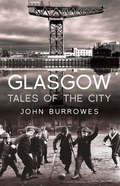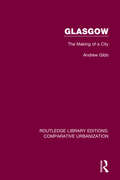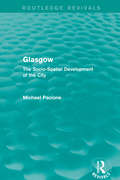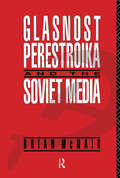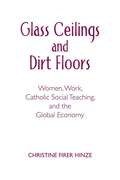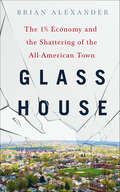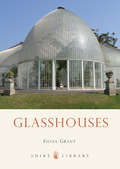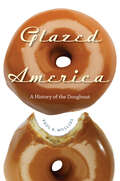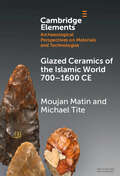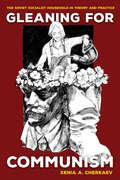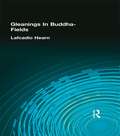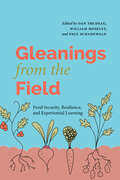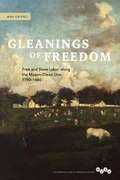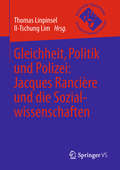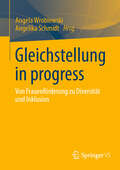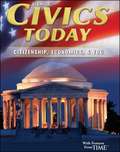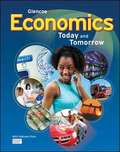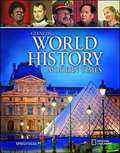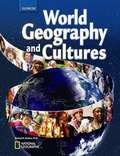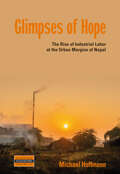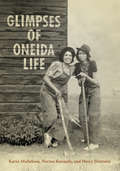- Table View
- List View
Glasgow: Tales of the City
by John BurrowesNot only has Glasgow produced some incredible personalities, it has also been witness to some of the greatest happenings of our times. These outstanding people and epoch-making events are featured in Glasgow: Tales of the City. As a result of painstaking research, some startling new facts have emerged about the life and times of some of the city's most interesting characters. The many individuals documented in this book include the world's greatest pilot, whose many flying feats are still held in great awe today and unlikely ever to be repeated. He was hailed as a hero in America, they gave a him a ticker-tape reception in New York and Hollywood begged him to be a star. More recently, Glasgow was popularised by a TV programme about the city's tough police officer Taggart. The role of the Glasgow detective made Mark McManus one of Scotland's first international TV stars, and Mark's own life story makes equally compelling reading.Before Billy Connolly, Glasgow's greatest-ever comedian was Lex McLean. He smashed all the box-office records in a Glasgow theatre and became a legend in his own lifetime. His story has never before been told in such detail. This is undoubtedly one of the most fascinating studies of Scotland's largest city ever published.
Glasgow: The Making of a City
by Andrew GibbOriginally published in 1983, this book sets the phases and elements of Glasgow’s townscape evolution in their historical framework, from the medieval period when Glasgow was a small but important burgh to the growth of the town thanks to its command of the transatlantic tobacco trade in the 18th Century. Examining the solid growth which came with the textile phase of the industrial revolution and subsequent pioneering achievements in ship-building and marine engineering, the book also charts the subsequent collapse of the industrial base and attempts at urban renewal on a massive scale.
Glasgow: The Socio-Spatial Development of the City (Routledge Revivals)
by Michael PacioneFirst published in 1995, this book employs a historical-geographical approach to illuminate the interaction between the multifarious social and spatial forces which have conditioned the processes and patterns of urban growth and change over time in Scotland’s principle city. The book is organised into two complementary parts. In the first part, a chronological approach is adopted to examine the main agents, processes and patterns underlying the development of the city from its pre-urban origins until the close of the nineteenth century. In the second part, the major issues relating to the socio-spatial development of Glasgow in the twentieth century are the subject of systematic examination. The book uses the geographical approach to synthesise relevant information from a plethora of sources to illuminate the changing geography of the city in a multi-perspective format. This volume will assist those who are interested to understand the geography of Scotland’s principle city, and is an ideal book for students and researchers of urban studies, geography, social science and Scottish studies. It provides a fascinating insight into the structure of a vibrant, dynamic and often misunderstood city.
Glasnost, Perestroika and the Soviet Media (Communication and Society)
by Brian McNairThe reforms of Mikhail Gorbachev have brought tumultuous change to political, social and economic life in the Soviet Union. But how have these changes affected Soviet press and television reporting? Glasnost, Perestroika and the Soviet Media examines the changing role of Soviet journalism from its theoretical origins in the writings of Marx and Lenin to the new freedoms of the Gorbachev era. The book includes detailed analysis of contemporary Soviet media output, as well as interviews with Soviet journalists.
Glass Ceilings And Dirt Floors: Women, Work, And The Global Economy
by Christine Firer HinzeToday's market economy depends upon, yet undervalues, the essential contributions of households to the care work that makes all other work possible. As designated tenders of the care economy, women take daily, costly responsibility for a fundamental fact that mainstream economics underplays or conceals, market economy depends continuously on another economy, wherein our embodied vulnerabilities are respected and addressed by way of caring labor and relationships. In this compelling expose on the (in)justice of women's work, Christine Firer Hinze argues for re-prioritizing the holistic understanding of economy as oikonomia-literally, the management of a household in order to sustainably provide for all members-assumed in traditional classical, and contemporary political economics. This oikos-focused paradigm addresses global work-family struggles at their roots by shifting the axis of our economic imaginations, values, and policy making from a marketized-competitive model to one that prioritizes economy's inclusive, provisioning purposes. Following several years of working in inner-city ministry and teaching high school in Detroit, Christine Firer Hinze received a PhD in Christian social ethics from the University of Chicago Divinity School. Her research and teaching focus on Catholic social and economic ethics, women and work, and power and social transformation. Book jacket.
Glass House: The 1% Economy and the Shattering of the All-American Town
by Brian AlexanderFor readers of Hillbilly Elegy and Strangers in Their Own LandWINNER OF THE OHIOANA BOOK AWARDS AND FINALIST FOR THE 87TH CALIFORNIA BOOK AWARDS |NAMED A BEST/MOST ANTICIPATED BOOK OF 2017 BY: New York Post • Newsweek • The Week • Bustle • Books by the Banks Book Festival • Bookauthority.comThe Wall Street Journal: "A devastating portrait...For anyone wondering why swing-state America voted against the establishment in 2016, Mr. Alexander supplies plenty of answers." Laura Miller, Slate: "This book hunts bigger game.Reads like an odd?and oddly satisfying?fusion of George Packer’s The Unwinding and one of Michael Lewis’ real-life financial thrillers."The New Yorker : "Does a remarkable job." Beth Macy, author of Factory Man: "This book should be required reading for people trying to understand Trumpism, inequality, and the sad state of a needlessly wrecked rural America. I wish I had written it." In 1947, Forbes magazine declared Lancaster, Ohio the epitome of the all-American town. Today it is damaged, discouraged, and fighting for its future. In Glass House, journalist Brian Alexander uses the story of one town to show how seeds sown 35 years ago have sprouted to give us Trumpism, inequality, and an eroding national cohesion.The Anchor Hocking Glass Company, once the world’s largest maker of glass tableware, was the base on which Lancaster’s society was built. As Glass House unfolds, bankruptcy looms. With access to the company and its leaders, and Lancaster’s citizens, Alexander shows how financial engineering took hold in the 1980s, accelerated in the 21st Century, and wrecked the company. We follow CEO Sam Solomon, an African-American leading the nearly all-white town’s biggest private employer, as he tries to rescue the company from the New York private equity firm that hired him. Meanwhile, Alexander goes behind the scenes, entwined with the lives of residents as they wrestle with heroin, politics, high-interest lenders, low wage jobs, technology, and the new demands of American life: people like Brian Gossett, the fourth generation to work at Anchor Hocking; Joe Piccolo, first-time director of the annual music festival who discovers the town relies on him, and it, for salvation; Jason Roach, who police believed may have been Lancaster’s biggest drug dealer; and Eric Brown, a local football hero-turned-cop who comes to realize that he can never arrest Lancaster’s real problems.
Glasshouses
by Fiona GrantThe orangeries and glasshouses that stand in the gardens of many stately homes help to tell a three-century story of garden fashion. They reflect both the architectural and social trends of their time, but above all show an increasing ability to tailor the buildings to the needs of the plants within. Starting with the Restoration fashion for cultivating pineapples, oranges and bananas within palatial orangeries, Fiona Grant then explains the development of glasshouses through the eighteenth century into the heyday of diversification and specialisation that charaterized the Victorian period, to the eventual decline of great glasshouses after the First World War. The role of the glasshouse as a display of status and of an interest in botany, technology and architecture is explored, and the book is colorfully illustrated throughout.
Glazed America: A History of the Doughnut
by Paul R. MullinsEverybody loves a good doughnut. The magic combination of soft dough, hot oil, and sugar coating--with or without sprinkles--inspires a wide range of surprisingly powerful memories and cravings. Yet we are embarrassed by our desire; the favorite food of Homer Simpson, caricatured as the dietary cornerstone of cops, a symbol of our collective descent into obesity, doughnuts are, in the words of one California consumer, a "food of shame."Paul Mullins turns his attention to the simple doughnut in order to learn more about North American culture and society. Both a breakfast staple and a snack to eat any time of day or night, doughnuts cross lines of gender, class, and race like no other food item. Favorite doughnut shops that were once neighborhood institutions remain unchanged--even as their surrounding neighborhoods have morphed into strip clubs, empty lots, and abandoned housing.Blending solid scholarship with humorous insights, Mullins offers a look into doughnut production, marketing, and consumption. He confronts head-on the question of why we often paint doughnuts in moral terms, and shows how the seemingly simple food reveals deep and complex social conflicts over body image and class structure.In Mullins's skillful hands, this simple pastry provides surprisingly compelling insights into our eating habits, our identity, and modern consumer culture.
Glazed Ceramics of the Islamic World 700–1600 CE (Elements in Archaeological Perspectives on Materials and Technologies)
by Moujan Matin Michael TiteOf all the material culture of the Islamic World prior to the sixteenth century, only ceramics survive in a way which forms a continuous representative visual history. As such, ceramics provide a unique collection of material from which to study the history of technology. The main technological developments associated with glazed Islamic ceramics were the introduction of tin-opacified glazes, stonepaste bodies, and an extended range of colorants. For each of these developments, consideration is given to the reasons why new technologies were introduced, from where the ideas for the new technologies originated, and why particular technological choices were made. In addition, brief consideration is given both to the very different glaze technologies employed in contemporary China, and to the subsequent spread of the glazed Islamic technology into Western Europe.
Gleams From Japan (Routledge Revivals)
by S. KatsumataFirst published in 1937 this is a collection of articles written by the author under the pseudonym 'Waseda Eisaku' for the Japan Tourist Bureau's magazine over twenty five years. Intended to satisfy the intellectual curiosity of cultivated tourists from abroad by giving the insider's view of all things Japanese, it was published as a book just before the outbreak of World War II. Writing in the first person, Katsumata becomes both guide and confidante, writing about his own travel experiences in Japan and about Japanese customs and practices that interest him, such as traditional incense ceremonies, or fishing with rod and creel. This personal approach results in an unusual selection of topics and itineraries including tray landscapes, old Japanese clocks, hot springs, Japanese humour, sumo wrestling, pines in Japanese scenery, the Japanese sun flag and Buddhist temple bells. The author not only describes, but draws the reader into his own experiences - his joy on buying an antiquarian book he cannot really afford, the monotony he feels when travelling too long through snowy landscapes, the delight he takes in telling you that the best bait for carp fishing is sweet potato. Katsumata's unconventional choice of subjects and his informal and individualistic writing style make this a refreshingly different guide to Japan, and a valuable record of the period in which it was written.
Gleaning for Communism: The Soviet Socialist Household in Theory and Practice
by Xenia A. CherkaevGleaning for Communism is a historical ethnography of the property regime upon which Soviet legal scholars legislated a large modern state as a household, with guaranteed rights to a commons of socialist property, rather than private possessions. Starting with former Leningrad workers' everyday stories about smuggling industrial scrap home over factory fences, Xenia Cherkaev traces collectivist ethical logic that was central to this socialist household economy, in theory and practice: from its Stalin-era inception, through Khrushchev's major foregrounding of communist ethics, to Gorbachev's perestroika, which unfurled its grounding tension between the interests of any given collective and of the socialist household economy itself. A story of how the socialist household economy functioned, how it collapsed, and how it was remembered, this book is haunted throughout by a spectral image of the totalitarian state, whose jealous political control over the economy leads it to trample over all that which ought to be private. Underlying this image, and the neoliberal state phobia it justified, is the question of how individual interests ought to relate to the public good in a large modern society, which, it is assumed, cannot possibly function by the non-private logics of householding. This book tells the story of a large modern society that did.
Gleanings In Buddha-Fields
by HearnFirst published in 2006. Routledge is an imprint of Taylor & Francis, an informa company.
Gleanings from the Field: Food Security, Resilience, and Experiential Learning
by Dan Trudeau, William Moseley Paul SchadewaldIn recent years, the concept of “food security” has garnered significant attention among policymakers, activists, and educators. Stemming from a growing awareness of the complexities surrounding access to sufficient food globally, movements advocating for food justice and sovereignty have emerged in response to these systemic inequities and health disparities, particularly in local communities. With the COVID-19 pandemic, conflicts in regions such as Ukraine and Gaza, and the escalating impacts of climate change, reliable food security has become exacerbated by these existing disparities. Gleanings from the Field argues that addressing food security is essential for tackling broader sustainability challenges facing humanity and recognizes the role of food in community-building, cultural exchange, and quality of life. However, promoting food security entails navigating intricate trade-offs, such as balancing economic interests in food supply with environmental concerns. This timely essay collection frames our food security challenges as “wicked problems,” puzzles without clear solutions that are characterized by evolving complexities and divergent stakeholder priorities. In classroom settings, they argue for the usage of experiential learning to cultivate “wicked problem-solving skills” among students. Gleanings from the Field exemplifies this approach, offering pedagogical interventions to prepare students for tackling these wicked problems, while advocating for high-impact learning experiences that enable students to grapple with the interconnected systems influencing food security. Through hands-on experiences and reflective practice, students gain a deeper understanding of these systems and their societal implications. Importantly, the contributions outlined in this volume underscore the need for a multidimensional view of food security, thus examining the intersections of economic interests, government policies, and social movements. By contextualizing food security within broader political-economic arrangements, educators can empower students to enact meaningful change. Gleanings from the Field argues for a holistic approach to food security education, one that acknowledges the fraught nature of wicked problems and equips students with the skills and knowledge needed for effective action. By integrating experiential learning, conceptual frameworks about food security and resilience, and real-world engagement, educators can cultivate a new generation of resilient problem-solvers committed to addressing food insecurity and other wicked problems.
Gleanings of Freedom: Free and Slave Labor along the Mason-Dixon Line, 1790-1860
by Max GrivnoLate eighteenth- and early nineteenth-century landowners in the hinterlands of Baltimore, Maryland, cobbled together workforces from a diverse labor population of black and white apprentices, indentured servants, slaves, and hired workers. This book examines the intertwined lives of the poor whites, slaves, and free blacks who lived and worked in this wheat-producing region along the Mason-Dixon Line. Drawing from court records, the diaries, letters, and ledgers of farmers and small planters, and other archival sources, Max Grivno reconstructs how these poorest of southerners eked out their livings and struggled to maintain their families and their freedom in the often unforgiving rural economy.
Gleichheit, Politik und Polizei: Jacques Rancière und die Sozialwissenschaften
by Thomas Linpinsel Il-Tschung LimJacques Rancière gilt als einer der einflussreichsten französischen Philosophen der Gegenwart, in dessen gesamtem Werk immer wieder das Motiv der radikalen Kritik an der Sozialwissenschaft in Szene gesetzt wird. In dem Sammelband werden zahlreiche Denkmotive des französischen Philosophen aus einer genuin sozialwissenschaftlichen Perspektive aufgegriffen, weitergedacht und kritisiert, wobei in den einzelnen Artikeln konkrete Forschungsperspektiven mit Rancière entwickelt, methodologische Überlegungen im Anschluss an Rancière vorgestellt, gesellschaftstheoretische Reflexionen vor dem Hintergrund der Kritik des Philosophen unternommen sowie Aspekte seines politischen Denkens in die politische Theorie integriert werden. Aber auch sozialwissenschaftliche Kritik an der Philosophie Rancières findet in den Argumentationen der Autorinnen und Autoren ihren Platz. Somit bietet der Band ein breit gefächertes Spektrum an sozialwissenschaftlichen Anschlüssen an das Denken des französischen Philosophen. Einerseits schließt der Sammelband damit eine Lücke in der sozialwissenschaftlichen Forschung und ist anderseits der erste genuin sozialwissenschaftliche Beitrag in der umfangreichen jüngeren Forschung zum philosophischen Werk Rancières.
Gleichstellung in progress: Von Frauenförderung zu Diversität und Inklusion
by Angela Wroblewski Angelika SchmidtDer Band thematisiert aktuelle Herausforderungen für Gleichstellungspolitik und die notwendige Weiterentwicklung gleichstellungspolitischer Konzepte, um Exklusionsmechanismen effektiv adressieren zu können. Die Beiträge diskutieren dies an der Schnittstelle zwischen Forschung und Politik sowie anhand konkreter Beispiele.
Gleichstellungspolitik im Kontext neuer Governance an Universitäten (Geschlecht und Gesellschaft #77)
by Birgit ErbeDas Buch widmet sich den immensen Herausforderungen, die an die Gleichstellungspolitik an Hochschulen gestellt werden, und stützt sich dabei auf Ansätze der Governance-, Organisations- und Geschlechterforschung. Mit der Hochschulreform seit Ende der 1990er Jahre sollte das ‚Steuerungsproblem‘ des Hochschulbereichs mit neuen, vom New Public Management geprägten Formen der Governance gelöst werden. Da das Steuerungsproblem auch auf die Hochschulgleichstellungspolitik zutrifft, sind die beiden zentralen Fragen der Untersuchung: Wo liegen die Chancen und Grenzen der veränderten Governance-Strukturen für Gleichstellungspolitik? Was bedeuten sie für die Praxis der Gleichstellungsakteur_innen an den Universitäten und für die Politik? Anhand von vier kontrastierenden Organisationsfallstudien wird nachvollzogen, wie es den untersuchten Universitäten trotz schwieriger Rahmenbedingungen gelingt, längerfristige gleichstellungspolitische Veränderungen innerhalb ihrer Organisationen zu realisieren und welche Faktoren dafür ausschlaggebend sind.
Gleichstellungspolitiken revisted: Zeitgemäße Gleichstellungspolitik an der Schnittstelle zwischen Politik, Theorie und Praxis
by Angela Wroblewski Angelika SchmidtAnfang der 1990er Jahre wurde erstmals von einem Backlash im Bereich der Frauenförderung und Gleichstellung gesprochen und die Strategien des Patriachats aufgezeigt, die den Forderungen von Frauen* nach gleichberechtigter Teilhabe entgegengesetzt werden. Aktuell wird wieder – nicht nur in Österreich – von einem Backlash gesprochen, der sich beispielsweise in einer Abkehr von der geschlechtsneutralen Sprache, in der Kürzung von Subventionen für Frauen- und Mädchenberatungseinrichtungen, im Rückbau von Institutionen und in Angriffen auf die Gender Studies niederschlägt. Zu diesen Phänomenen von Backlash kam es trotz der Etablierung zahlreicher Institutionen im Bereich Gleichstellung und Bekenntnisse zur Förderung von Vielfalt auf politischer Ebene und von Unternehmensseite. Ausgehend von diesem ambivalenten Befund zum Status Quo von Gleichstellung werden Anforderungen an eine zeitgemäße Gleichstellungspolitik an der Schnittstelle zwischen Politik, Theorie und Praxis formuliert. Die Beiträge in dem Band zeigen aktuelle Herausforderungen für Gleichstellungspolitik und illustrieren, wie die Schnittstelle ausgestaltet werden kann.
Glencoe Civics Today: Citizenship, Economics, & You
by John J. Patrick Richard C. Remy Gary E. Clayton David C. SaffelCivics Today: Citizenship, Economics, and Youmeets the content standards for civics and government as outlined by the National Standards for Civics and Government.Many young citizens are completing their education with little or no sense of civic responsibility.Civics Today: Citizenship, Economics, and Youteaches the knowledge and skills needed to be an effective, active citizen. It also encourages an appreciation for the American political system. It will foster a willingness to take part in American democracy.Two economics units provide an understanding of the interrelationship between democracy and the free enterprise system. .
Glencoe World History: Modern Times
by Jackson J. SpielvogelRecent world history in a motivating format Glencoe World History: Modern Timesdraws on the features ofGlencoe World Historyto motivate students, help them understand the connections between recent world events and issues, and give them an appreciation for the interconnectedness of the world's regions and peoples..
Glencoe: World Geography and Cultures [Grade 10]
by Richard G. BoehmA world view from renowned authors World Geography and Culturesoffers a fascinating view of the world enlivened by a meticulous presentation that focuses on the development of geographic literacy. Every region is studied in three parts: physical geography, cultural geography, and current events.
Glencoe: World Geography and Cultures [Grade 10]
by Richard G. BoehmA world view from renowned authors World Geography and Cultures offers a fascinating view of the world enlivened by a meticulous presentation that focuses on the development of geographic literacy. Every region is studied in three parts: physical geography, cultural geography, and current events.
Glimpses of Hope: The Rise of Industrial Labor at the Urban Margins of Nepal (Dislocations #32)
by Michael HoffmannOver the last decade, Nepal has witnessed significant urban growth and an expanding urban middle class. Glimpses of Hope tells the story of the people who enable some of the middle-class consumer practices in urban Nepal. The book focuses on workers in areas such as modern food-processing, water-bottling, housebuilding, and sand-mining industries and explores how workers see such forms of work, where union organization can help, and how work opportunities emerge along lines of gender and ethnicity. Although global labor relations have been mostly in decline for decades, this ethnography offers insights and glimpses of hope in terms of labor dynamics and the opportunities various jobs may afford.
Glimpses of Oneida Life
by Norma Kennedy Karin Michelson Mercy A. DoxtatorGlimpses of Oneida Life is a remarkable compilation of modern stories of community life at the Oneida Nation of the Thames Settlement and the surrounding area. With topics ranging from work experiences and Oneida customs to pranks, humorous encounters, and ghost stories, these fifty-two unscripted narrations and conversations in Oneida represent a rare collection of first-hand Iroquoian reflections on aspects of daily life and culture not found in print elsewhere.Each text is presented in Oneida with both an interlinear, word-by-word translation and a more colloquial translation in English. The book also contains a grammatical sketch of the Oneida language by Karin Michelson, co-author of the Oneida-English/English-Oneida Dictionary, that describes how words are structured and combined into larger linguistic structures, thus allowing Glimpses to be used as a teaching text as well.The engrossing tales in Glimpses of Oneida Life will be a valuable resource for linguists and language learners, a useful source for those studying the history and culture of Iroquois people in the twentieth-century, and an entertaining read for anyone interested in everyday First Nations life in southern Ontario.
